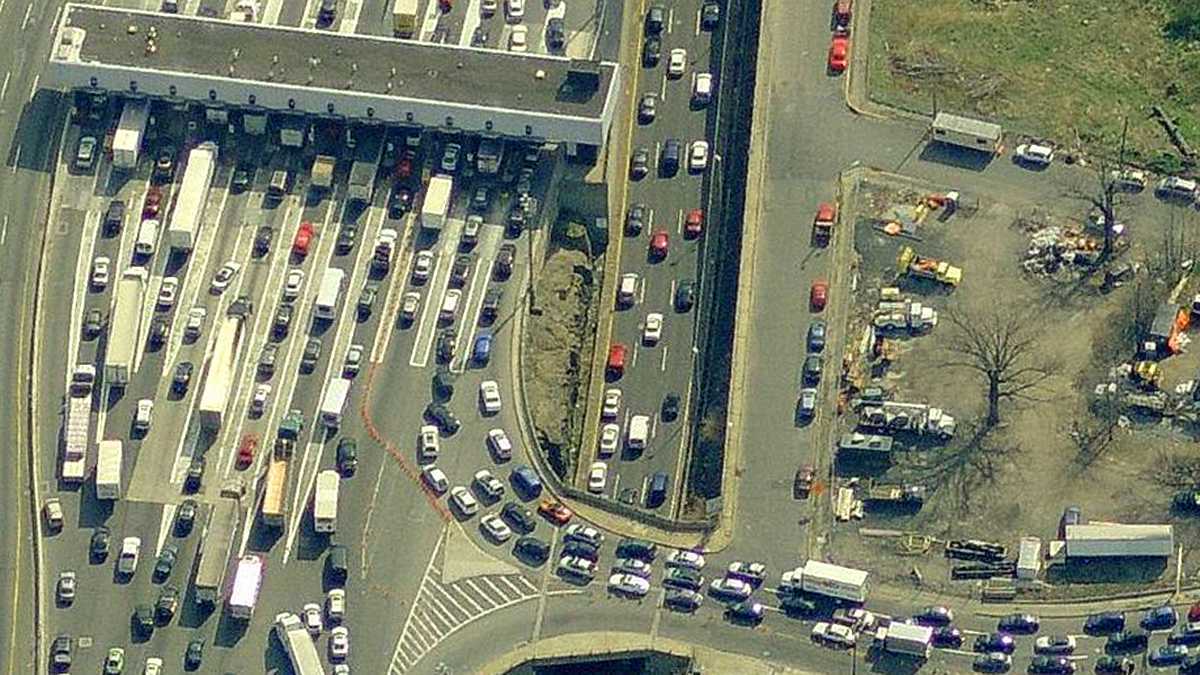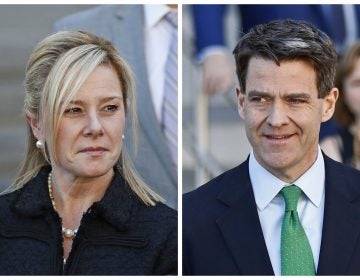The Bridgegate trial is finally here, and hopefully we’ll learn if others knew

Aerial view of the Fort Lee access lanes onto the George Washington Bridge. (Image via Bing Maps)
When the trial of two former Christie administration staffers for their role in the closing of access lanes to the George Washington Bridge in Fort Lee three years ago begins this month, it will arguably be the most closely watched legal proceeding since the Abscam courtroom drama captured national attention 36 years ago.
Granted, the central figures in the Abscam sting operation were much higher profile — a United States Senator from New Jersey, a half-dozen members of the House of Representatives, and more than 20 others were convicted and sent to jail — but when Bridget Anne Kelly, the governor’s former deputy chief of staff, and Bill Baroni, the former deputy executive director of the Port Authority of New York and New Jersey, take their places at the defendants’ table in a federal courtroom in Newark, public attention will be focused laser-like on them. The possibility of Christie testifying only sharpens the anticipatory edge.
The Trial
Location: U.S. Courthouse, 50 Walnut Street, Newark, New Jersey
Jury selection: Thursday, Sept 8, 2016
Opening arguments: Scheduled to begin Sept 19, 2016.
Duration: The trial is expected to last six weeks
Abscam was all about money and greed and its reach and scope far exceeds that of Bridgegate. It was a sordid, grubby tale of bribes and payoffs, surreptitious audio and video recordings in hotel rooms, and briefcases stuffed with cash. Bridgegate, on the other hand, is all about power run amok. There’s never been even the slightest hint that anyone involved in the lane-closure scheme profited financially from it. Rather, it was an ill-conceived and arrogant exercise in using the authority of the executive office to send a chilling message — agree to our demands or pay a price.
Even coming in the midst of a presidential campaign drenched in vitriol, the accounts of the bridge scandal trial will certainly share above-the-fold newspaper space with the grenade-tossing contest between Donald Trump and Hillary Clinton.
Kelly and Baroni stand accused of engineering a four-day closure of the bridge access lanes, producing massive traffic jams and risking public safety, as part of a scheme to punish the borough’s Democratic mayor for his refusal to endorse Christie’s reelection in 2013.
A third defendant, David Wildstein, a former high-level staffer at the Port Authority, has pleaded guilty to his role in the plot.
The cover story that the lanes were restricted as part of an authority-sanctioned traffic study collapsed with the discovery of an e-mail from Kelly to Wildstein: “Time for some traffic problems in Fort Lee.” When Kelly was indicted by a federal grand jury, she blurted out that it was “ludicrous” to believe that others in the governor’s office were unaware of the scheme or the cover-up attempt that followed.
Presumably, should she be a witness in her own defense, she’ll be asked to explain her assertion and reveal the names of those who either knew in advance of the plot, who were aware but did nothing to stop it, or who facilitated and promoted the cover story.
It is likely further that the names of the unindicted co-conspirators — a list kept secret under court order — will be disclosed at some point during the trial.
Christie has been steadfast in his denials that he knew of the scheme, and nothing has surfaced thus far to contradict him. He was, however, accused of lying by a former member of his staff over his assertion that no one on his senior staff was involved.
Attorneys for the defendants have hinted they will argue, among other points, that Kelly and Baroni engaged in common and legitimate political activities, none of which rose to criminal levels.
An open-court debate over permissible or forbidden acts in furtherance of a political end may prove fascinating or enlightening to some and frightening to others.
Political considerations are an accepted part of daily life in any governor’s office whose occupants are either elected or who serve in positions to which they were appointed due in some measure to political activity or because they share an ideology and philosophy of government with the governor.
These individuals should not be demeaned or looked upon with disdain as unworthy or unqualified and who hold their jobs solely because of political clout. They are at-will employees — that is, any one of them could be dismissed at any time without explanation. They are tasked with carrying out duties and responsibilities assigned to them by their superiors in pursuit of public support for an agenda which, in their view, serves the common good. While they have wide latitude, there are boundaries to be observed and lines that cannot be crossed. Significant gray areas exist and great care must be taken upon venturing into them. Judgment and instinct should guide the decision-making process. When those qualities are skewed or ignored — for whatever reason — controversy is sure to follow.
While it will be Kelly and Baroni in the dock, the system will be on trial as well. Were they, for instance, engaged in business as usual, politics as usual, or did they abuse the power with which they were entrusted as a weapon of retribution?
The gray area in which governor’s office staff operates is a fluid one. Its general environment is established by those in positions above them. Business as usual, politics as usual is defined by those from whom they take direction.
When the decision was reached and the plan set in motion to restrict access to one of the busiest bridges in the world during the week when terrorist alerts were heightened, the boundaries of propriety and common sense were not merely breached, they were obliterated.
And, to do so as punishment for the refusal of a small-town mayor to endorse the governor’s reelection, even though his support would have been insignificant in the outcome, is sheer lunacy by any standard.
Kelly and Baroni stand accused, but the question remains: Did they act out of an understanding that the atmosphere in which they and others worked encouraged and celebrated political retribution? Many of the gleeful e-mail messages exchanged between the principals involved suggested as much.
A jury, of course, will decide whether criminal law was violated or whether Kelly and Baroni, along with Wildstein, felt they acted in accordance with the prevailing environment.
Bridgegate has attracted a higher level of speculation and theories than any government incident in recent memory. Who knew what and when? Who turned a blind eye toward misbehavior? Who concocted or participated in a cover-up?
Some three years later, the speculation will be put to rest and the theories refuted. It is a certainty, though, that Bridgegate will forever be a part of New Jersey political lore as well the Christie legacy.
____________________________________________________
NJ Spotlight, an independent online news service on issues critical to New Jersey, makes its in-depth reporting available to NewsWorks.
WHYY is your source for fact-based, in-depth journalism and information. As a nonprofit organization, we rely on financial support from readers like you. Please give today.


